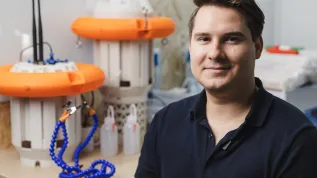
A team of engineers from Warsaw has won the 2025 James Dyson Award in the “Sustainability” category, a global recognition for young inventors tackling real-world problems.
The winning project, ‘WaterSense’ uses smart sensors and artificial intelligence to monitor water quality in real time.
Over 20 parameters are measured at autonomous stations scattered across Poland’s rivers.
The technology can signal ecological threats, predict environmental impacts up to 72 hours in advance, and help prevent disasters.
Team leader Filip Budny, a doctoral candidate at the Warsaw University of Technology and CEO of the tech startup Magly said: “It all started with winning second place in the Polish edition of the James Dyson Award 2025. Then, we made it to the top 20 inventions in the world, and finally, Sir James Dyson himself selected WaterSense as the winner of the International Sustainability Award 2025.
“We are now entering a very intense phase – preparing for the pre-seed round, which we plan to use to further develop the technology and expand monitoring coverage to Poland’s main rivers, the Vistula and the Oder, by the end of next year.
“This will serve as a launching point for scaling the project to European markets and building global recognition for WaterSense, with the ambition of making a real impact on the quality of inland waters.”
WaterSense was developed in collaboration with several units of the Warsaw University of Technology, including the Faculty of Mechanical and Industrial Engineering, the Faculty of Chemistry, and CEZAMAT, along with the Institute of Meteorology and Water Management and the tech company Nebucode.
“The system is addressed to anyone interested in water quality research in Poland: local governments, water and sewage industry companies, and non-governmental organizations focused on environmental issues,” Budny added.
The award comes with a £30,000 prize (approximately PLN 145,000), but for the team, the recognition is about more than money.
The competition website said: “The James Dyson Award supports young inventors who think differently and tackle real-world problems head-on. Our 2025 winners, Filip and Alessandra, are a testament to that spirit – they address challenging health and environmental issues with practical, ingenious solutions.”
Sir James Dyson also praised the innovation, saying: “I hope that winning the Award will be a springboard for commercialising their world-beating inventions.”
Over the past year, more than 20 prototype stations have been installed across Poland, and the team is now developing new methods to improve sensor calibration and prevent biofouling – the buildup of aquatic organisms on submerged surfaces – ensuring the data remains accurate. They are also building the WaterMap platform, which will allow users to monitor river health in real time.
Budny said: “By giving everyone, from scientists to local authorities, the ability to monitor water quality instantly, we hope to prevent ecological disasters before they happen.”
Poland has a growing history of international recognition for student innovation. In 2022, the Warsaw University of Technology’s SMARTHEAL project took the global James Dyson Award, and in 2023, Piotr Tłuszcz received a special award for his humanitarian project, Chariot of Life.
Katarzyna Czechowicz (PAP)
kap/ agt/
tr. RL













